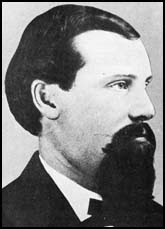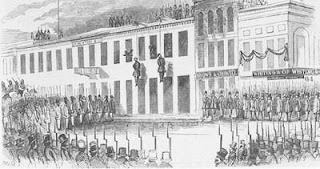The park is about 20 miles west of Interstate-15 on State Hwy 278 and about 60 miles south of Butte Montana. If you're planning a Montana summer vacation, Bannack celebrates it's highly popular "Bannack Days" the third weekend of every July. The annual event is a celebration of pioneer days with great western events, good cooking and a fun and entertaining time for the whole family. There are dozens of historic buildings to explore and are considered by many to be the finest preserved buildings of any ghost town in America's old west.
Bannack State Park is a good addition to any Montana vacation planner. Following is an interesting tale of what occurred in Bannack in 1863-64. Bannack was one of the unique towns of Montana and it's on the U.S. Register of Historic Places.
Sheriff Henry Plummer
 |
| Henry Plummer |
Bannack Montana, established in 1862, started out as many Montana towns did in the region. It was a gold mining camp. What's also true of old gold mining towns, Bannack attracted it's share of characters..some hard working and honest and some who were not.
Gold mining towns and regions meant money and money is what attracts outlaws. Sometimes it was easy pickings because the law enforcement was either weak or non existent. The vigilante was often used to enforce law and order. Nevertheless, people poured into the area as they did whenever rich ore was discovered.
As a result, the new town needed a sheriff and this is where Henry Plummer enters the picture. Plummer, born in 1832, became official sheriff of Bannack in May 1863. Since Montana Territory was not created until 1865, at the time Plummer took over as sheriff the town was in the Idaho Territory. There was a lot to Henry Plummer's story before he ever made to Montana.
At nineteen years of age the young Plummer set sail from new York to California via Panama. When he arrived in San Francisco he headed straight for the goldfields. Research show that Plummer headed to the wild Nevada City California, then a big boom town, and acquired a mine and ranch. The next thing we know he bought the Empire Bakery in Nevada City. Two years after that he was asked to run for town sheriff. He did and in 1856 Plummer was the only official lawman in the area for miles. After he won reelection in 1857, trouble was not far behind.
The Gunfights of Henry Plummer's Past
 |
| Bannack Ghost Town |
His confinement didn't last long. After many of Plummer's friends sent letters and petitions to the governor attesting to his good character, etc, Plummer was released in 1859. The tale is that the pardon was really granted for health reasons because Plummer allegedly suffered with tuberculosis.
Henry Plummer's troubles didn't end with the pardon. After his release in 1859 he subsequently shot and killed an inmate attempting to escape from San Quentin. He was tried and found innocent based on justifiable homicide but under the condition that he leave the state. As if this wasn't enough, Plummer traveled to the mining region of Washington State where he again was involved in a gunfight altercation where he came out ahead.
At this point Henry Plummer decided to head back east and during his trip he was persuaded to help a man in Montana protect his family from an anticipated Indian raid. The next stop on Plummer's journey took him to Bannack Montana where the gold mines were going full tilt. The problem however was that he found himself in a gunfight with his wife's previous suitor. The gunfight occurred in a saloon and there were many witnesses testifying that Plummer had been forced into the fight. With that behind him Plummer was asked to be town sheriff of Bannack and he took over the position in August 1863. I have found no research that indicates that the Bannack town folk knew much about Plummer's somewhat tarnished and volent past.
Trouble in Bannack
 |
| Courtesy chippee, CC License 2.0 |
In addition to this a man was murdered. It seems that the appointment of the town sheriff brought with it a crime wave. While Plummer was out of Bannack supposedly to guard a gold shipment several men got together in the nearby gold boom town of Virginia City Montana. There they formed a Vigilance Committee.
A Vigilance Committee is simply a group of private citizens who decide to administer law themselves. It is referred to as vigilantism. These men decided that things were just too out of control in the Montana gold country and they would apply what was known in the old west as the lynch law. The photo above right is of more abandoned buildings in the Bannack State Park.
Vigilance Committees were in place in many areas of the old west, particularly in mining regions where valuable shipments were made on a regular basis. As civilization increased and the courts and law enforcement agencies grew the need for them vanished.
How active was this new Vigilance Committee? In their first month they lynched twenty-four men. Their last lynching was Henry Plummer in January 1864, not even one year after he became sheriff. The vigilantes were quite busy and fast. Vigilance Committees had been around for a long time as the drawing below left depicts a Vigilance hanging in 1856 San Francisco. This would have been the period where characters from the gold rush would have drifted into San Francisco.
The Montana Vigilantes
 Needless to say, the Montana Vigilante's became both an admired and feared group. Like many stories from the old west, historians differ in their interpretation of what the vigilante's did. One question that's frequently asked is..did they hang an innocent man?
Needless to say, the Montana Vigilante's became both an admired and feared group. Like many stories from the old west, historians differ in their interpretation of what the vigilante's did. One question that's frequently asked is..did they hang an innocent man?Could a frenzied lynch mob really take the time to fully investigate? Skeptics would say..did they really care?
Some contend that Henry Plummer was nothing but an innocent victim of a lynch mob. Others (mostly the committee) felt that Plummer, even while being sheriff, was actually the leader of the outlaw group who did the robbing and killing.
For those taking the opinion that Plummer was innocent, they cite that he objected to the vigilante lynchings taking place while away and in so doing made the Vigilante Committee leader angry. Therefore he was lynched because of his sympathy for the accused and nothing more. Those historians accepting that Plummer was involved in the robberies and all the men hanged were including Plummer were guilty cite that with the lynchings of the alleged gang members and of Plummer himself, the crime spree came to an end. That fact cannot be disputed. Was Henry Plummer guilty? Let us know what you can uncover.
(Article copyright Western Trips. Photos and images from the public domain)

